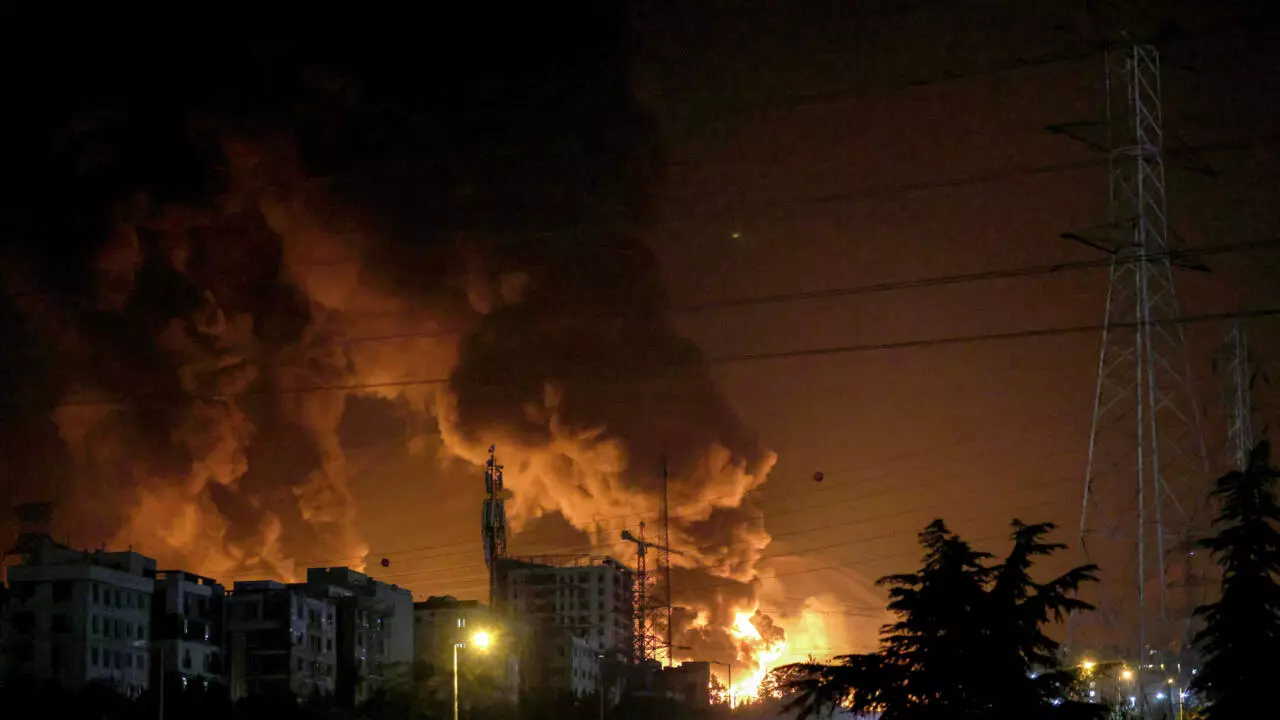Breaking: Israeli Airstrike Khojir Missile Complex – 5 Shocking Details Near Tehran

The Middle East is once again on edge as an Israeli airstrike on the Khojir Missile Complex near Tehran has escalated already tense relations between Israel and Iran. The strike, which targeted a highly sensitive missile production facility, is seen as a significant development in the ongoing shadow war between the two nations.
What is the Khojir Missile Complex?
Located east of Tehran, the Khojir Missile Complex is one of Iran’s most significant military production facilities. Reports suggest that it plays a crucial role in the development of ballistic missiles and possibly in the assembly of nuclear centrifuges. The facility has long been under the scrutiny of Israeli intelligence and Western powers due to its strategic importance in the Israel Iran Conflict.
According to satellite imagery and open-source intelligence, the complex houses multiple underground bunkers and heavily fortified manufacturing plants. The recent Israeli airstrike Khojir Missile Complex attack was aimed at disrupting Iran’s growing missile capabilities, which Israel views as an existential threat fueling Middle East Tensions.
1. Details of the Israeli Airstrike Khojir Missile Complex Attack
The Israeli airstrike Khojir Missile Complex occurred in the early hours of June 17, 2025. Witnesses in Tehran reported hearing multiple loud explosions, and satellite images confirmed plumes of smoke rising from the area. While Iranian state media initially downplayed the incident, independent sources and international agencies confirmed that significant damage was inflicted on the facility.
Objectives Behind the Israeli Airstrike Khojir Missile Complex
Israel’s objectives are clear:
-
Disrupt Missile Development: The Khojir complex is central to Iran’s missile production. Targeting it hampers Iran’s ability to produce advanced ballistic missiles capable of reaching Israel and beyond.
-
Send a Strategic Message: By striking so close to Tehran, Israel demonstrates its intelligence capabilities and its willingness to engage in a preemptive strike.
-
Undermine Iran’s Nuclear Ambitions: Although primarily a missile facility, the Khojir complex is believed to have links to Iran’s nuclear program.
2. Historical Context: Israel vs. Iran
The Israeli airstrike Khojir Missile Complex is not an isolated event. It is part of a broader strategy known as the “campaign between the wars” (known in Hebrew as MABAM), where Israel conducts covert and overt operations against Iranian assets across the region, intensifying the Israel Iran Conflict.
Previous Attacks
-
Natanz Nuclear Facility (2020): A suspected Israeli cyberattack caused significant damage.
-
Syria Strikes: Israel has routinely targeted Iranian weapons shipments and proxies in Syria.
-
Nuclear Scientists: Several Iranian nuclear scientists have been assassinated, with Israel often blamed.
These actions aim to delay Iran’s nuclear program and ballistic missile capabilities while avoiding full-scale war.
3. International Reactions to Israeli Airstrike Khojir Missile Complex
United States
The U.S., Israel’s closest ally, has traditionally supported Israeli security operations. However, this strike has drawn mixed reactions. Some U.S. officials express concerns about escalating Middle East tensions, while others view it as a necessary step to curtail Iran’s destabilizing activities.
European Union
The EU has called for restraint, fearing that such actions could derail ongoing diplomatic efforts to revive the 2015 Iran Nuclear Deal (JCPOA).
United Nations
The UN Secretary-General urged both nations to avoid further escalation, emphasizing dialogue and diplomacy.
4. Implications of Israeli Airstrike Khojir Missile Complex for the Middle East
The Israeli airstrike Khojir Missile Complex could have far-reaching consequences:
Risk of Retaliation
Iran may seek revenge through its regional proxies like Hezbollah, or via cyberattacks against Israeli infrastructure, increasing the danger of proxy warfare.
Regional Instability
An escalation between Israel and Iran could destabilize neighboring countries, draw in global powers, and spark wider Middle East conflicts.
Nuclear Deal Jeopardy
Diplomatic negotiations surrounding the JCPOA may collapse if military actions continue.
5. Strategic Analysis: What Comes Next?
Diplomatic Channels
Backchannel negotiations, possibly mediated by European countries or Qatar, may emerge to de-escalate tensions.
Military Buildup
Both nations may increase military preparedness. Israel could bolster its missile defense systems, while Iran might reinforce its facilities and proxies.
Cyber Warfare
Cyberattacks could become the next front, with both nations possessing sophisticated capabilities.
Expert Opinions on the Israeli Airstrike Khojir Missile Complex
Dr. Matthew Levitt, a senior fellow at the Washington Institute, remarked:
“This strike sends a powerful message to Tehran. Israel is willing to cross traditional red lines to prevent Iran from becoming a nuclear-armed state.”
Meanwhile, Trita Parsi of the Quincy Institute warns:
“Such attacks could backfire, hardening Iran’s resolve and undermining moderate voices advocating diplomacy.”
Israel’s Security Doctrine Behind the Airstrike
Israel’s security doctrine is built on preemptive strikes. The Israeli airstrike Khojir Missile Complex aligns with this approach:
-
Preemptive Strikes: Neutralize threats before they fully materialize.
-
Intelligence Superiority: Use advanced intelligence gathering to locate and strike sensitive targets.
-
Strategic Partnerships: Leverage alliances, especially with the U.S., to maintain a qualitative military edge.
Iran’s Response to Israeli Airstrike Khojir Missile Complex
Iranian officials have vowed a “decisive response,” but the nature of this retaliation remains uncertain. Possible scenarios include:
-
Cyberattacks against Israeli infrastructure.
-
Proxy attacks via Hezbollah, Hamas, or the Houthis.
-
Missile launches targeting Israeli territory.
Media Coverage and Public Sentiment
The Israeli airstrike Khojir Missile Complex has dominated global headlines. While many Israelis view the strike as necessary for national security, there are also voices warning about the dangers of provoking a broader Middle East conflict.
In Iran, government-controlled media portrays the strike as an act of aggression while rallying nationalist sentiments.
Conclusion: The Stakes Are High After the Israeli Airstrike Khojir Missile Complex
The Israeli airstrike Khojir Missile Complex underscores the fragile state of Middle East geopolitics. As both nations brace for potential retaliation, global powers must tread carefully to avoid a catastrophic conflict.
For continuous updates on this developing story, follow credible sources such as Al Jazeera, BBC, and Reuters.
Internal Links:
DoFollow External Links:
